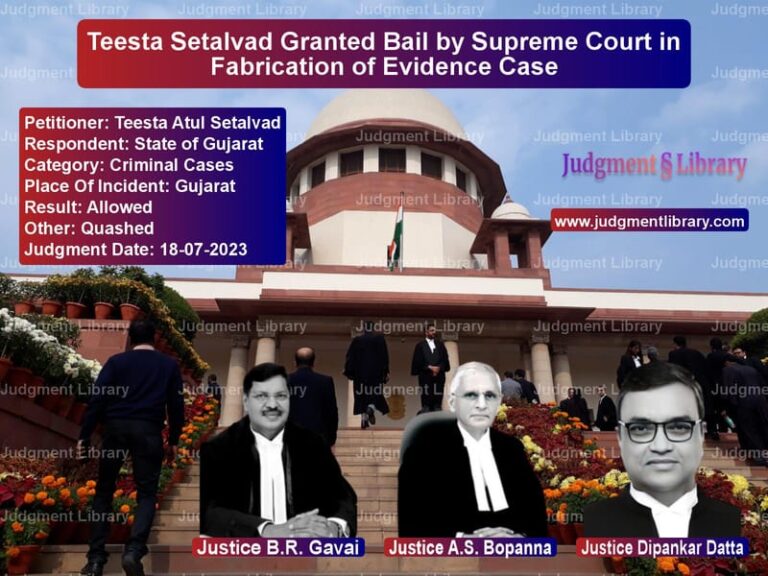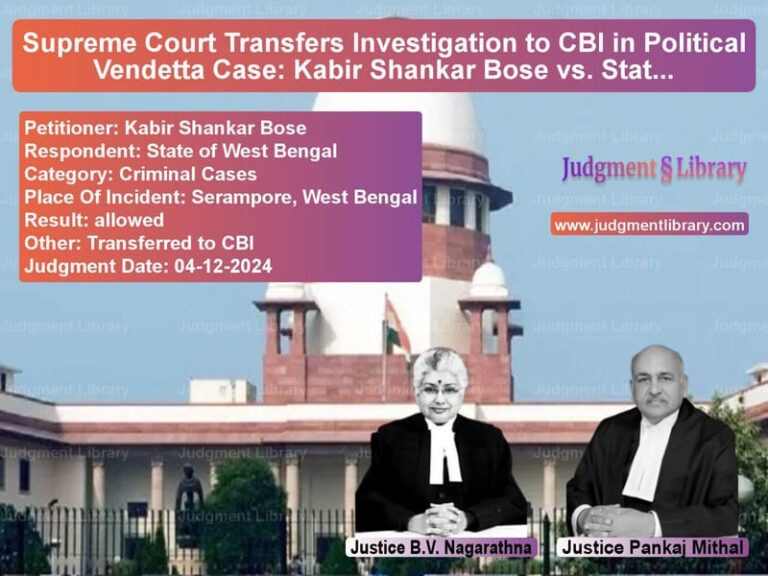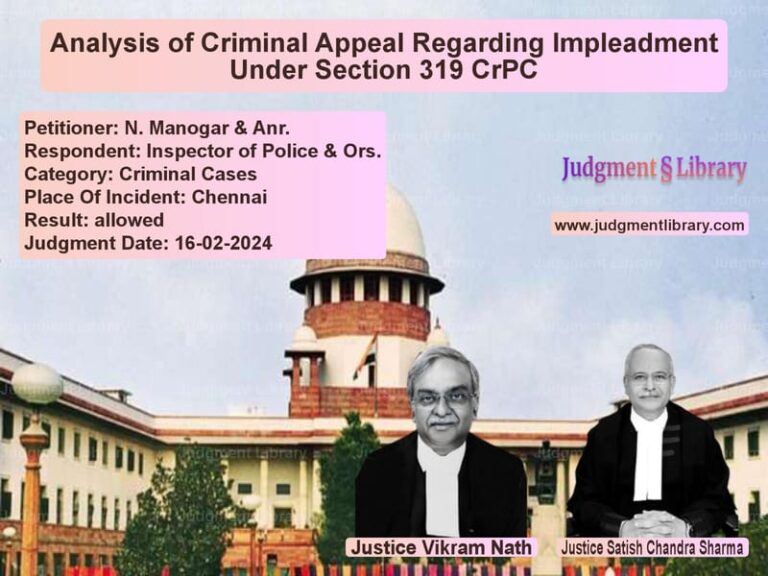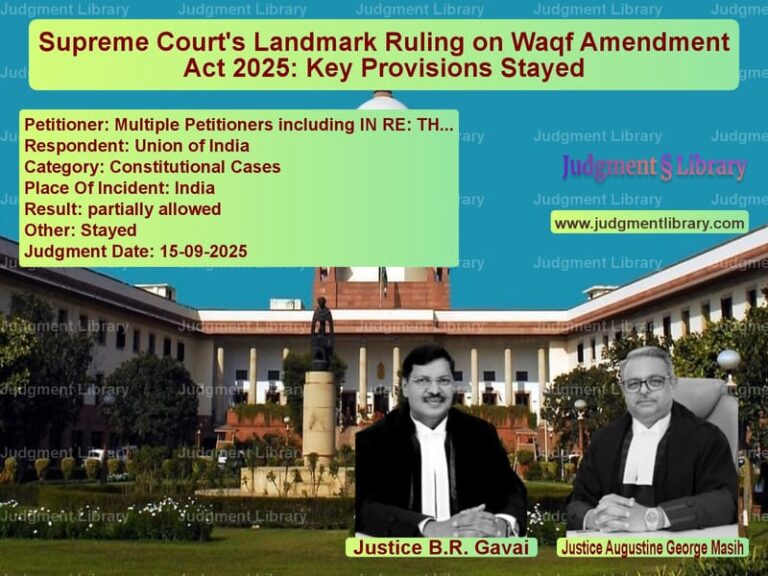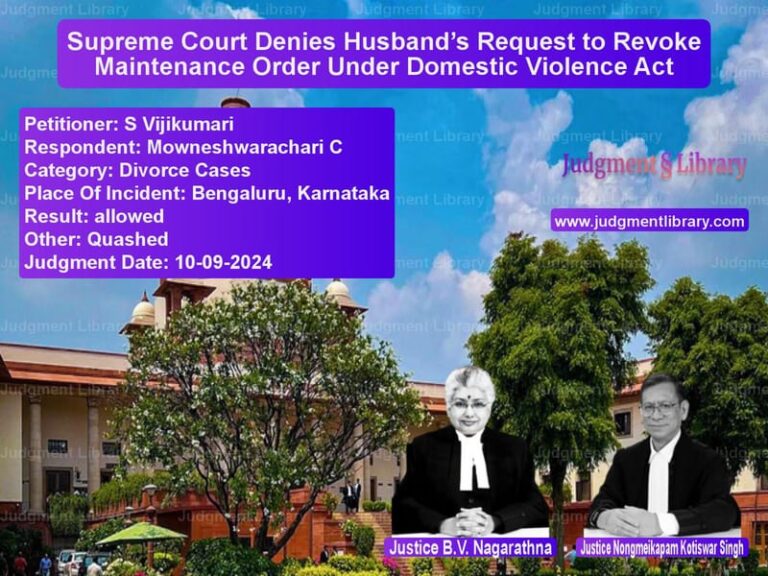Diplomatic Immunity and Criminal Proceedings: Supreme Court Rejects Seychelles Ambassador-at-Large’s Plea
The case of C. Sivasankaran vs. Union of India & Ors. is a landmark ruling concerning diplomatic immunity and criminal proceedings in India. The Supreme Court examined whether the petitioner, an Ambassador-at-large of Seychelles, was entitled to diplomatic immunity under the Vienna Convention on Diplomatic Relations and whether criminal proceedings against him should be quashed. The Court ultimately dismissed his petition, affirming that he does not qualify as a diplomatic agent under the Convention.
Background of the Case
The petitioner, C. Sivasankaran, filed a writ petition under Article 32 of the Indian Constitution, claiming that as an Ambassador-at-large of Seychelles, he was entitled to diplomatic immunity and could not be prosecuted in India.
The Madras High Court had earlier dismissed his petition on November 6, 2019, ruling that he did not qualify for diplomatic immunity. Aggrieved by the decision, he approached the Supreme Court, seeking the following reliefs:
- A declaration that he enjoys diplomatic immunity under the Vienna Convention on Diplomatic Relations, 1961.
- Quashing of all criminal proceedings against him.
- A declaration that certain provisions of the Diplomatic Relations (Vienna Convention) Act, 1972, were unconstitutional and required to be read down.
Petitioner’s Arguments
The petitioner, through his legal counsel, made the following assertions:
- As an Ambassador-at-large of Seychelles, he should be granted diplomatic immunity under the Vienna Convention.
- His diplomatic passport confirms his official status, and thus, India is bound to recognize his immunity.
- The criminal proceedings against him should be quashed as they violate the principles of international law.
- The High Court erred in its ruling, and its decision should be overturned.
Respondent’s Arguments
The respondents, including the Union of India and the Central Bureau of Investigation (CBI), strongly opposed the petition. Their key arguments were:
- The Ministry of External Affairs (MEA) had clarified that while the petitioner held a diplomatic passport, he was not on official duty in India.
- The Vienna Convention does not extend immunity to an Ambassador-at-large unless he is performing official duties.
- The petitioner’s activities under investigation were commercial in nature and did not pertain to official diplomatic functions.
- The Madras High Court had already ruled on this issue, and its decision was legally sound.
Supreme Court’s Observations
The Supreme Court critically examined the arguments and made several key observations:
1. Petitioner Does Not Qualify for Diplomatic Immunity
The Court reaffirmed that under Article 1 of the Vienna Convention, diplomatic immunity is granted to recognized “diplomatic agents”. The Court stated:
“The petitioner does not come within the sweep of the definition of ‘diplomatic agent’ or any other category of officials referred to in Article 1 of the Vienna Convention.”
Thus, he cannot claim immunity under international law.
2. Official Communications from Seychelles Confirmed the Petitioner’s Status
The Court relied on official communications from the Seychelles Government provided by the Ministry of External Affairs:
“The petitioner is an Ambassador-at-large but was not in India on any official duty. His presence in India does not entitle him to diplomatic immunity.”
The Court ruled that these communications were binding and left no room for doubt.
3. Commercial Activities Do Not Grant Immunity
The Court referred to Article 31 of the Vienna Convention, which provides limited exceptions to immunity:
“The petitioner is not covered by Article 31 of the Convention but falls within the exception, as his activities being investigated do not pertain to any official functions but in respect of his commercial activities.”
Since the criminal charges related to private business dealings, diplomatic immunity did not apply.
4. No Justification for Challenging the High Court’s Ruling
The Court criticized the petitioner for re-arguing a case that had already been decided:
“The judgment of the Madras High Court stares at the face of the petitioner, which has remained unchallenged; we are in agreement with the view expressed therein.”
Supreme Court’s Verdict
After considering all aspects, the Supreme Court:
- Dismissed the petition, upholding the Madras High Court ruling.
- Declared that the petitioner does not enjoy diplomatic immunity under the Vienna Convention.
- Held that the petitioner’s activities fell under commercial exceptions to immunity.
- Reprimanded the petitioner for filing a petition without annexing the High Court’s judgment.
- Criticized the inclusion of a legal opinion from a former Supreme Court judge in the petition, calling it “unacceptable.”
Implications of the Judgment
This ruling has significant implications for diplomatic immunity laws and criminal proceedings in India:
- Strict Interpretation of Diplomatic Immunity: The Court reinforced that immunity applies only when a diplomat is on official duty.
- Prevention of Misuse: The ruling prevents individuals from misusing diplomatic status to escape criminal liability.
- Reinforcement of Judicial Authority: The Court reaffirmed that once a High Court has ruled on a matter, re-arguing the case without new evidence is impermissible.
- Accountability of Diplomats: Even foreign diplomats must prove they were on official duty to claim immunity.
The decision sets an important precedent for handling cases involving foreign diplomatic personnel accused of criminal misconduct in India.
Petitioner Name: C. Sivasankaran.Respondent Name: Union of India & Ors..Judgment By: Justice A.M. Khanwilkar, Justice Dinesh Maheshwari, Justice C.T. Ravikumar.Place Of Incident: India.Judgment Date: 07-12-2021.
Don’t miss out on the full details! Download the complete judgment in PDF format below and gain valuable insights instantly!
Download Judgment: c.-sivasankaran-vs-union-of-india-&-ors-supreme-court-of-india-judgment-dated-07-12-2021.pdf
Directly Download Judgment: Directly download this Judgment
See all petitions in Fundamental Rights
See all petitions in Constitution Interpretation
See all petitions in Public Interest Litigation
See all petitions in Judgment by A M Khanwilkar
See all petitions in Judgment by Dinesh Maheshwari
See all petitions in Judgment by C.T. Ravikumar
See all petitions in dismissed
See all petitions in supreme court of India judgments December 2021
See all petitions in 2021 judgments
See all posts in Constitutional Cases Category
See all allowed petitions in Constitutional Cases Category
See all Dismissed petitions in Constitutional Cases Category
See all partially allowed petitions in Constitutional Cases Category


